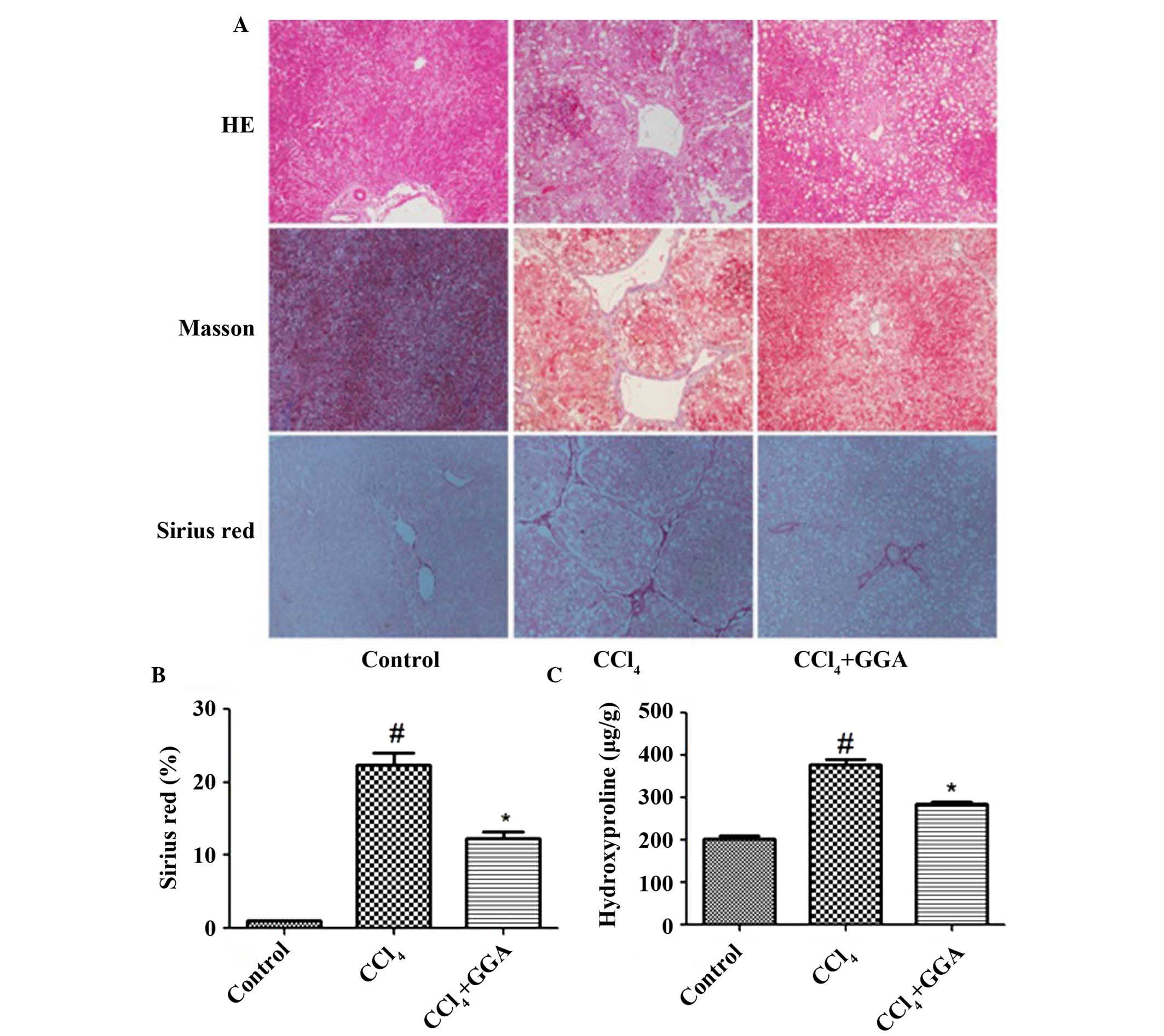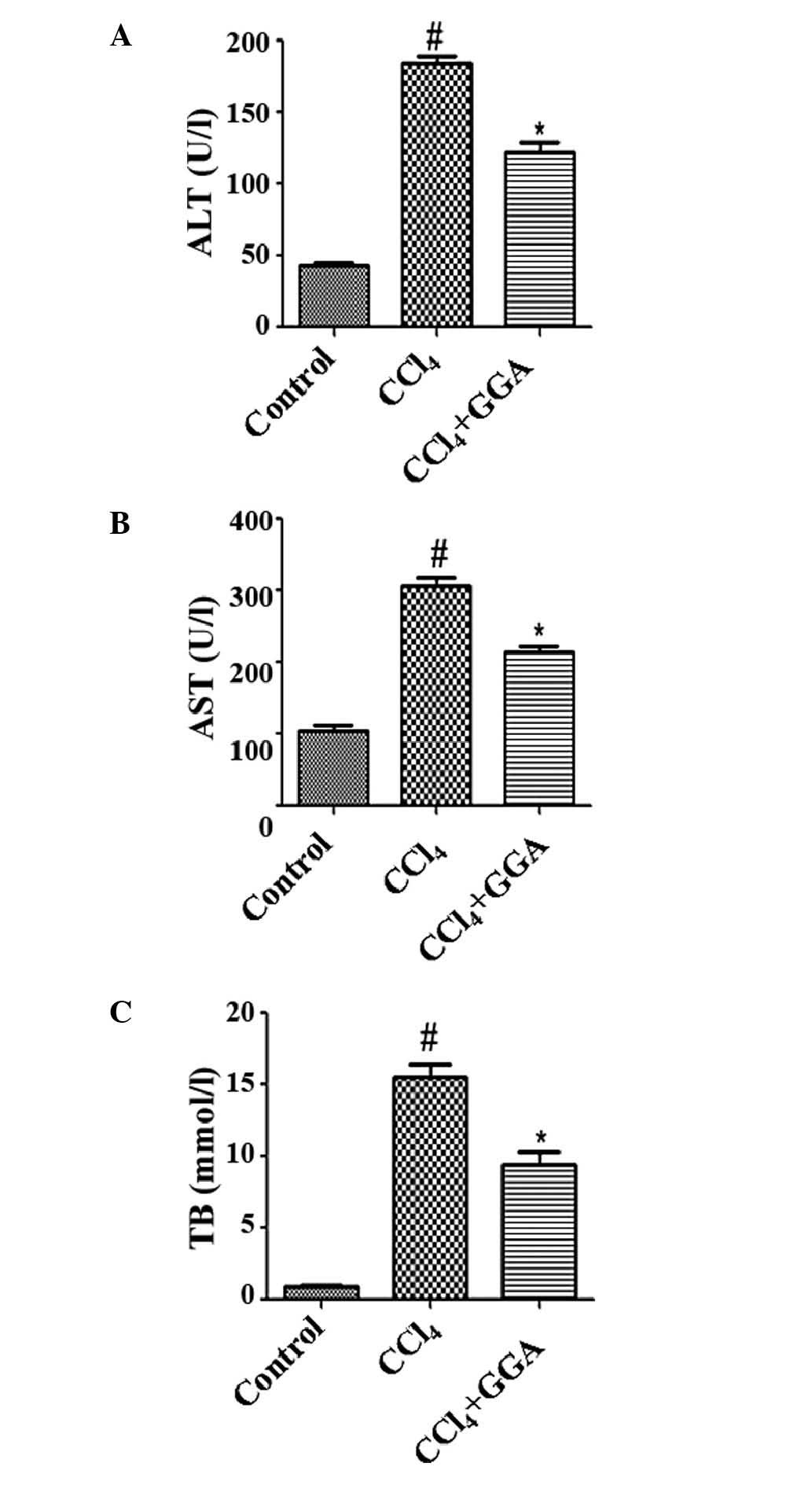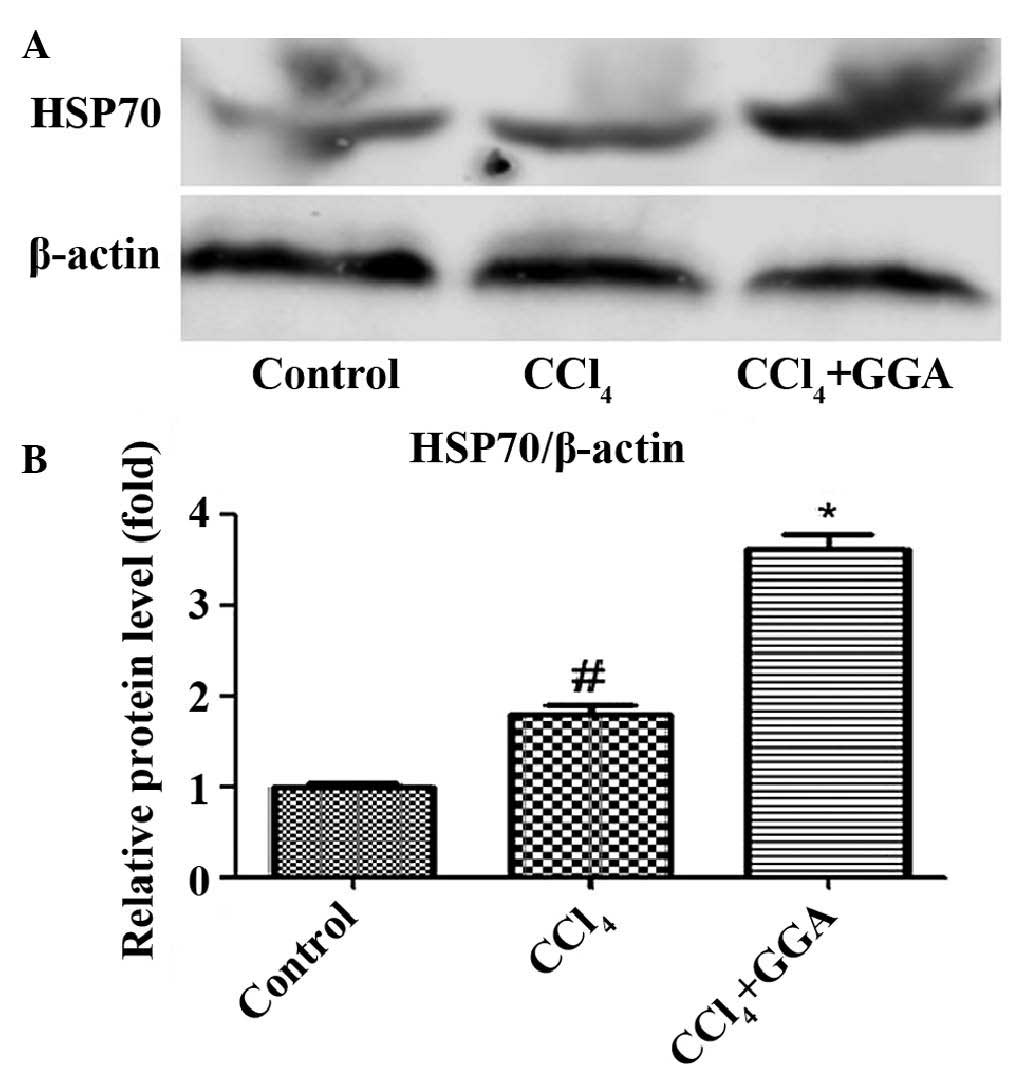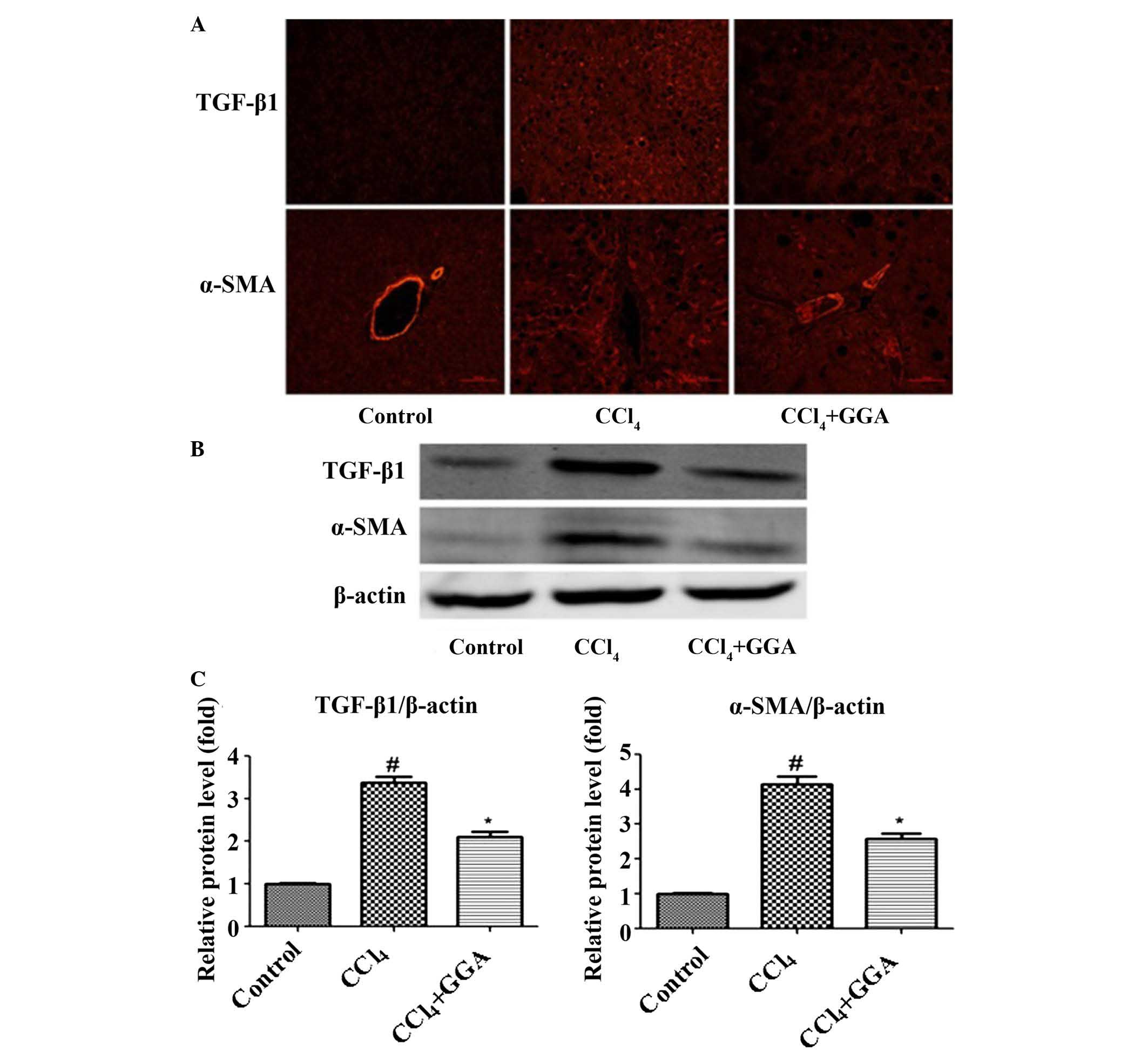|
1
|
Bellaye PS, Burgy O, Causse S, Garrido C
and Bonniaud P: Heat shock proteins in fibrosis and wound healing:
Good or evil? Pharmacol Ther. 143:119–132. 2014. View Article : Google Scholar : PubMed/NCBI
|
|
2
|
Booz GW, Carl LL and Baker KM:
Amplification of angiotensin II signaling in cardiac myocytes by
adenovirus-mediated overex-pression of the AT1 receptor: Ann NY.
Acad Sci. 874:20–26. 1999. View Article : Google Scholar
|
|
3
|
Bukau B and Horwich AL: The Hsp70 and
Hsp60 chaperone machines. Cell. 92:351–366. 1998. View Article : Google Scholar : PubMed/NCBI
|
|
4
|
Friedman SL: Molecular regulation of
hepatic fibrosis, an integrated cellular response to tissue injury.
J Biol Chem. 275:2247–2250. 2000. View Article : Google Scholar : PubMed/NCBI
|
|
5
|
Friedman SL: Hepatic stellate cells:
Protean, multifunctional, and enigmatic cells of the liver. Physiol
Rev. 88:125–172. 2008. View Article : Google Scholar : PubMed/NCBI
|
|
6
|
Shiber A and Ravid T: Chaperoning proteins
for destruction: Diverse roles of Hsp70 chaperones and their
co-chaperones in targeting misfolded proteins to the proteasome.
Biomolecules. 4:704–724. 2014. View Article : Google Scholar : PubMed/NCBI
|
|
7
|
Fudaba Y, Ohdan H, Tashiro H, Mizunuma K,
Ito H, Fukuda Y, Dohi K and Asahara T: High dose of
geranylgeranylacetone accumulate HSP72 mRNA in rat liver.
Transplant Proc. 33:9782001. View Article : Google Scholar : PubMed/NCBI
|
|
8
|
Reus IS, Bando I, Andres D and Cascales M:
Relationship between expression of HSP70 and metallothionein and
oxidative stress during mercury chloride induced acute liver injury
in rats. J Biochem Mol Toxicol. 17:161–168. 2003. View Article : Google Scholar : PubMed/NCBI
|
|
9
|
Fudaba Y, Tashiro H, Ohdan H, Miyata Y,
Shibata S, Shintaku S, Nishihara M, Asahara T, Ito H, Fukuda Y and
Dohi K: Efficacy of HSP72 induction in rat liver by orally
administered geranylgeranylacetone. Transpl Int. 13(Suppl 1):
S278–S281. 2000. View Article : Google Scholar : PubMed/NCBI
|
|
10
|
Fujibayashi T, Hashimoto N, Jijiwa M,
Hasegawa Y, Kojima T and Ishiguro N: Protective effect of
geranylgeranylacetone, an inducer of heat shock protein 70, against
drug-induced lung injury/fibrosis in an animal model. BMC Pulm Med.
9:452009. View Article : Google Scholar : PubMed/NCBI
|
|
11
|
Goette A, Staack T, Röcken C, Arndt M,
Geller JC, Huth C, Ansorge S, Klein HU and Lendeckel U: Increased
expression of extracellular signal-regulated kinase and
angiotensin-converting enzyme in human atria during atrial
fibrillation. J Am Coll Cardiol. 35:1669–1677. 2000. View Article : Google Scholar : PubMed/NCBI
|
|
12
|
González-Ramos M, Calleros L, López-Ongil
S, Raoch V, Griera M, Rodríguez-Puyol M, de Frutos S and
Rodríguez-Puyol D: HSP70 increases extracellular matrix production
by human vascular smooth muscle through TGF-β1 up-regulation. Int J
Biochem Cell Biol. 45:232–242. 2013. View Article : Google Scholar
|
|
13
|
Kahloon RA, Xue J, Bhargava A, Csizmadia
E, Otterbein L, Kass DJ, Bon J, Soejima M, Levesque MC, Lindell KO,
et al: Patients with idiopathic pulmonary fibrosis with antibodies
to heat shock protein 70 have poor prognoses. Am J Respir Crit Care
Med. 187:768–775. 2013. View Article : Google Scholar :
|
|
14
|
Kanemura H, Kusumoto K, Miyake H, Tashiro
S, Rokutan K and Shimada M: Geranylgeranylacetone prevents acute
liver damage after massive hepatectomy in rats through suppression
of a CXC chemokine GRO1 and induction of heat shock proteins. J
Gastrointest Surg. 13:66–73. 2009. View Article : Google Scholar
|
|
15
|
Lee UE and Friedman SL: Mechanisms of
hepatic fibrogenesis. Best Pract Res Clin Gastroenterol.
25:195–206. 2011. View Article : Google Scholar : PubMed/NCBI
|
|
16
|
Luo FC, Zhao L, Deng J, Liang M, Zeng XS,
Liu H and Bai J: Geranylgeranylacetone protects against
morphine-induced hepatic and renal damage in mice. Mol Med Rep.
7:694–700. 2013.
|
|
17
|
Mao H, Li Z, Zhou Y, Li Z, Zhuang S, An X,
Zhang B, Chen W, Nie J, Wang Z, et al: HSP72 attenuates renal
tubular cell apoptosis and interstitial fibrosis in obstructive
nephropathy. Am J Physiol Renal Physiol. 295:F202–F214. 2008.
View Article : Google Scholar : PubMed/NCBI
|
|
18
|
Myung SJ, Yoon JH, Kim BH, Lee JH, Jung EU
and Lee HS: Heat shock protein 90 inhibitor induces apoptosis and
attenuates activation of hepatic stellate cells. J Pharmacol Exp
Ther. 330:276–282. 2009. View Article : Google Scholar : PubMed/NCBI
|
|
19
|
Ooie T, Takahashi N, Saikawa T, Nawata T,
Arikawa M, Yamanaka K, Hara M, Shimada T and Sakata T: Single oral
dose of geranylgeranylacetone induces heat-shock protein 72 and
renders protection against ischemia/reperfusion injury in rat
heart. Circulation. 104:1837–1843. 2001. View Article : Google Scholar : PubMed/NCBI
|
|
20
|
Routsias JG and Tzioufas AG: The role of
chaperone proteins in autoimmunity. Ann NY Acad Sci. 1088:52–64.
2006. View Article : Google Scholar : PubMed/NCBI
|
|
21
|
Takahashi N, Kume O, Wakisaka O, Fukunaga
N, Teshima Y, Hara M and Saikawa T: Novel strategy to prevent
atrial fibrosis and fibrillation. Circ J. 76:2318–2326. 2012.
View Article : Google Scholar : PubMed/NCBI
|
|
22
|
Chen J: Chloroquine improved carbon
tetrachloride-induced liver fibrosis through its inhibition of the
activation of hepatic stellate cells: Role of autophagy. Biol Pharm
Bull. 37:1505–1509. 2014. View Article : Google Scholar : PubMed/NCBI
|
|
23
|
Nouchi T, Tanaka Y, Tsukada T, Sato C and
Marumo F: Appearance of alpha-smooth-muscle-actin-positive cells in
hepatic fibrosis. Liver. 11:100–105. 1991. View Article : Google Scholar : PubMed/NCBI
|
|
24
|
Hellerbrand C, Stefanovic B, Giordano F,
Burchardt ER and Brenner DA: The role of TGFbeta1 in initiating
hepatic stellate cell activation in vivo. J Hepatol. 30:77–87.
1999. View Article : Google Scholar : PubMed/NCBI
|
|
25
|
Tanaka K, Tanaka Y, Namba T, Azuma A and
Mizushima T: Heat shock protein 70 protects against
bleomycin-induced pulmonary fibrosis in mice. Biochem Pharmacol.
80:920–931. 2010. View Article : Google Scholar : PubMed/NCBI
|
|
26
|
Shin Y, Klucken J, Patterson C, Hyman BT
and McLean PJ: The co-chaperone carboxyl terminus of
Hsp70-interacting protein (CHIP) mediates alpha-synuclein
degradation decisions between proteasomal and lysosomal pathways. J
Biol Chem. 280:23727–23734. 2005. View Article : Google Scholar : PubMed/NCBI
|
|
27
|
Tsuruma T, Yagihashi A, Koide S, Araya J,
Tarumi K, Watanabe N and Hirata K: Geranylgeranylacetone induces
heat shock protein-73 in rat small intestine. Transplant Proc.
31:572–573. 1999. View Article : Google Scholar : PubMed/NCBI
|
|
28
|
Wakisaka O, Takahashi N, Shinohara T, Ooie
T, Nakagawa M, Yonemochi H, Hara M, Shimada T, Saikawa T and
Yoshimatsu H: Hyperthermia treatment prevents angiotensin
II-mediated atrial fibrosis and fibrillation via induction of
heat-shock protein 72. J Mol Cell Cardiol. 43:616–626. 2007.
View Article : Google Scholar : PubMed/NCBI
|
|
29
|
Wu C: Heat shock transcription factors:
Structure and regulation. Annu Rev Cell Dev Biol. 11:441–469. 1995.
View Article : Google Scholar : PubMed/NCBI
|
|
30
|
Wynn TA: Common and unique mechanisms
regulate fibrosis in various fibroproliferative diseases. J Clin
Invest. 117:524–529. 2007. View
Article : Google Scholar : PubMed/NCBI
|


















